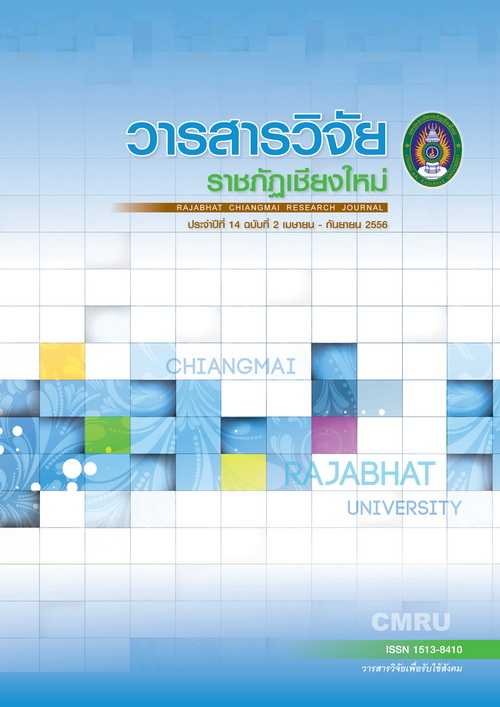การพัฒนารูปแบบการผลิตพืชผักสอนครัวเพื่อสุขภาพ ของชุมชนสะลวง-ขี้เหล็ก อำเภอแม่ริม จังหวัตเชียงใหม่
DOI:
https://doi.org/10.14456/rcmrj.2013.96143Keywords:
การผลิตพืซผักสวนครัว, สูฃภาพ, ครัวเรือน, แหล่งเรียนรู้, Home garden vegetable production, Healthy, Household, Learning resourcesAbstract
การวิจัยนี้มีวัตถุประสงค์เพื่อพัฒนารูปแบบการผลิตพืชผักสวนครัวเพื่อสุขภาพระดับครัวเรือนในชุมชนสะลวง-ขี้เหล็ก อำเภอแม่ริม จังหวัดเชียงใหม่ ใช้รูปแบบการวิจัยแบบผสมผสาน สุ่มตัวอย่างแบบบังเอิญจากประซาซนที่สนใจ จำนวน 58 คน เก็บรวบรวมข้อมูลเซิงปริมาณด้วยแบบสอบถาม ใช้การสัมภาษณ์ กระบวนการกสุ่ม และการอบรมเซิงปฏิบัติการแบบมีส่วนร่วมในการรวบรวมข้อมูลเซิงคุณภาพ วิเคราะห์ข้อมูลด้วยสถิติเซิงพรรณนาและสถิติวิเคราะห์ และการวิเคราะห์เซิงเนื้อหา ผลการศึกษาพบว่า ประซาซนมีความรู้เกี่ยวกับพืซผักเพื่อสุขภาพโดยรวมอยู่ในระดับรู้มาก (ค่าเฉลี่ย = 0.73, ค่าส่วนเบี่ยงเบนมาตรฐาน = 0.42) การปฏิบัติเกี่ยวกับการผลิตพืชผักเพื่อสุขภาพโดยรวมอยู่ในระดับการปฏิบัติเป็นบางครั้ง (ค่าเฉลี่ย = 2.03,ค่าส่วนเบี่ยงเบนมาตรฐาน = 0.75) ในส่วนของประสิทธิผลของแหล่งเรียนรู้การผลิตปุยหมักจากเศษอินทรียวัตถุโดยใช้ไส้เดือนดินย่อยสลาย เมื่อวิเคราะห์ความแตกต่างของค่าคะแนนทดสอบความรู้เฉลี่ยก่อนและหลังการเรียนรู้ พบว่า ค่าคะแนนทดสอบความรู้เฉลี่ยหลังเรียนรู้มีค่าสูงกว่าก่อนการเรียนรู้อย่างมีนัยสำคัญทางสถิติที่ระดับนัยสำคัญ .05 (P-value = 0.047) การพัฒนารูปแบบการผลิตพืชผักเพื่อสุขภาพทั้งการอบรมเซิงปฏิบัติการและการสร้างแหล่งเรียนรู้ได้เพิ่มพูนองค์ความรู้ ด้านการผลิตปุยหมักจากเศษวัชพืชโดยใช้ไส้เดือนดินย่อยสลาย โดยผลจากการดำเนินกิจกรรมได้ก่อให้เกิดความคิดรวบยอด ในตนเองของประซาซนนำไปสู่การพัฒนาทักษะในการผลิตปุยหมักจากเศษวัสดุเหลือทิ้งทางการเกษตรที่ปกติจะต้องเผาทิ้ง
DEVELOPMENT OF HEALTHY HOME GARDEN VEGETABLE PRODUCTION MODEL IN SALUANG-KEELEK COMMUNITY, MAE RIM DISTRICT, CHIANG MAI PROVINCE
The purpose of this research was to developing model of healthy home garden vegetable production at Saluang-Keelek community, Maerim district, Chiang Mai province. This research utilized mixed methodology. A sample group used for this research consisted of 58 people were accidental sampling. Quantitative data were collected using questionnaire. Qualitative data were collected using participation workshop, in-depth interview and focus group. Data were analyzed using descriptive and analytic statistic and content analysis. The results showed that people had knowledge in high level (Mean = 0.73, S.D. = 0.42), produced healthy home garden vegetable production in sometimes (Mean = 2.03, S.D. = 0.75). The efficiency of learn about production of vermicompost showed scores posttest were higher than pretest by significant (P-value = 0.047). A model development of healthy home garden vegetable production by workshop training and established knowledge resource were increased the knowledge about production of the vermicompost. The results of the activities lead concept to develop their skills of making compost from agricultural waste instead of burning.
Downloads
Downloads
How to Cite
Issue
Section
License
1. Articles, information, content, images, etc published in the “Community and Social Development Journal” are copyrighted by the Community and Social Development Journal, Chiang Mai Rajabhat University. In order to properly distribute the articles through print and electronic media, the authors still hold the copyright for the published articles under the Creative Commons Attribution (CC BY) license, which allows the re-distribution of the articles in other sources. References must be made to the articles in the journal. The authors are responsible for requesting permission to reproduce copyrighted content from other sources.
2. The content of the articles appearing in the journal is the direct responsibility of the article authors. The editorial board of the journal does not necessarily agree with or share any responsibility.














